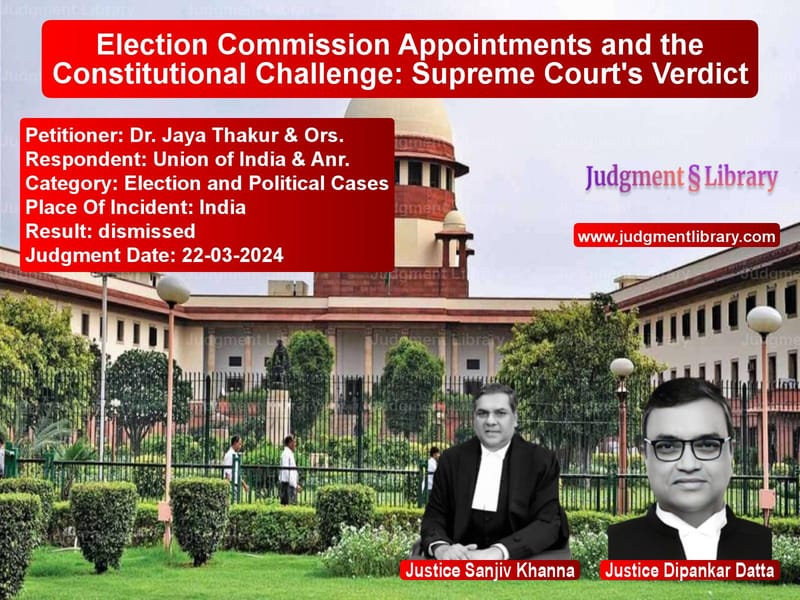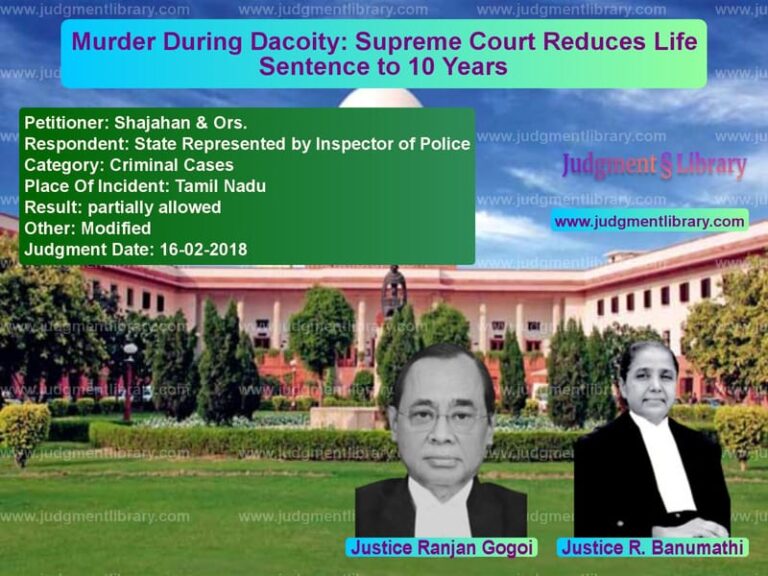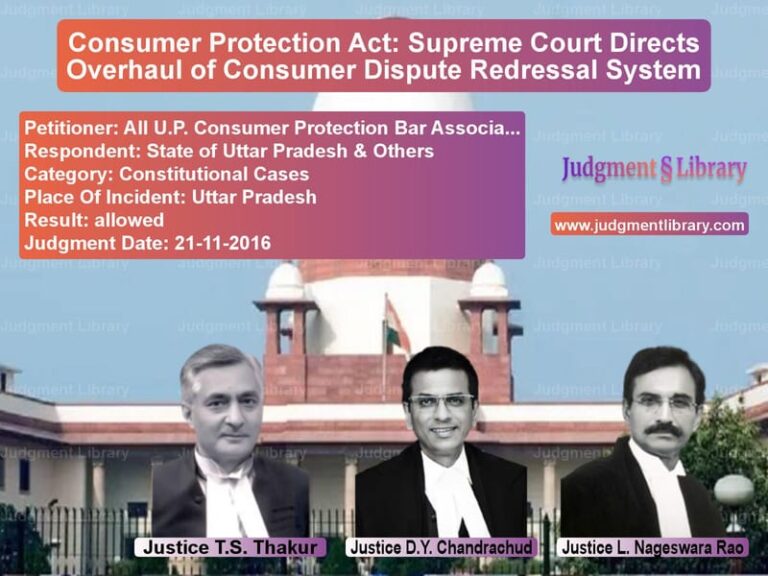Election Commission Appointments and the Constitutional Challenge: Supreme Court’s Verdict
The Supreme Court of India recently delivered a significant judgment in the case of Dr. Jaya Thakur & Ors. v. Union of India & Anr. regarding the constitutional validity of Section 7(1) of the Chief Election Commissioner and Other Election Commissioners (Appointment, Conditions of Service, and Term of Office) Act, 2023. The petitions were filed under Article 32 of the Constitution, primarily challenging the legality of the selection process for Election Commissioners (ECs) and the impact it may have on free and fair elections in the country.
The primary contention of the petitioners was that the 2023 Act modifies the previous Supreme Court ruling in Anoop Baranwal v. Union of India, which had mandated the inclusion of the Chief Justice of India (CJI) in the Selection Committee for appointing the Chief Election Commissioner (CEC) and ECs. Instead, the 2023 Act replaces the CJI with a Union Cabinet Minister nominated by the Prime Minister, thereby altering the process significantly. The petitioners argued that this change compromises the independence of the Election Commission and affects the fairness of elections.
Petitioners’ Arguments
The petitioners raised the following concerns:
- The exclusion of the CJI from the Selection Committee diminishes transparency and fairness in the appointment of ECs.
- The Leader of Opposition (LoP) was not given adequate time or necessary details of the shortlisted candidates before the selection meeting, violating principles of fair decision-making.
- The selection and appointment of ECs proceeded while the constitutional challenge to the 2023 Act was sub-judice, demonstrating procedural irregularity.
- The act weakens the Election Commission’s independence and may undermine the fundamental principles of democratic elections.
Respondent’s Arguments
The Union of India defended the validity of the 2023 Act by stating:
- The Act was enacted under Article 324(2) of the Constitution and came into effect on January 2, 2024.
- The Selection Committee was legally constituted on February 1, 2024, comprising the Prime Minister, Home Minister, and the LoP.
- The selection process was carried out in accordance with statutory provisions, and the appointment of ECs was essential for the smooth functioning of the Election Commission.
- The Union argued that the Court should exercise judicial restraint when reviewing legislations and should not intervene unless there is a clear violation of constitutional provisions.
Supreme Court’s Observations
The Court analyzed the matter by considering multiple factors:
- The judgment in Anoop Baranwal had mandated an independent process due to a legislative vacuum. However, once Parliament enacted the 2023 Act, the Court cannot dictate how the law should be framed.
- The Court observed that in constitutional challenges, interim relief should be granted only when a law is ex-facie unconstitutional or violates fundamental rights. A stay should not be issued merely because a challenge exists.
- The Court acknowledged procedural concerns but held that the upcoming General Elections made it impractical to interfere at this stage.
- The judgment emphasized that ECs, once appointed, are expected to act in accordance with constitutional principles and are bound by their duty to uphold free and fair elections.
Key Judicial Remarks
The Supreme Court, while refusing to grant a stay, made several important observations:
“In matters involving constitutionality of legislations, courts are cautious and show judicial restraint in granting interim orders. Unless the provision is ex-facie unconstitutional or manifestly violates fundamental rights, the statutory provision cannot be stultified by granting an interim order.”
Regarding concerns over procedural irregularities, the Court noted:
“Selections should be made with full details and particulars of the candidates being circulated to all members of the Selection Committee. The sanctity of the process should not be affected. Nevertheless, in spite of the said shortcoming, we do not deem it appropriate at this stage, keeping in view the timelines for the upcoming 18th General Elections for the Lok Sabha, to pass any interim order or direction.”
Further, the Court reinforced the expectation that ECs will act independently:
“Once a constitutional post holder is selected, they are duty-bound to act in accordance with the letter and spirit of the Constitution. The assumption is that they shall adhere to constitutional role and propriety in their functioning.”
Final Judgment
The Court dismissed the applications seeking a stay on the appointments of ECs and ruled that the selection process would remain valid. However, it clarified that its observations were tentative and not final on the question of constitutionality, as the matter was still pending for a detailed hearing.
With the General Elections scheduled between April 19 and June 1, 2024, the Court found that granting a stay would cause uncertainty and administrative complications. It reiterated that judicial intervention in legislative matters should be exercised with caution unless there is a clear and egregious violation of constitutional principles.
Conclusion
The Supreme Court’s judgment in this case highlights the delicate balance between judicial review and legislative authority. While concerns over procedural fairness were acknowledged, the Court ultimately prioritized stability and electoral continuity. The larger constitutional question regarding the validity of the 2023 Act remains open and will be examined in due course.
Petitioner Name: Dr. Jaya Thakur & Ors..Respondent Name: Union of India & Anr..Judgment By: Justice Sanjiv Khanna, Justice Dipankar Datta.Place Of Incident: India.Judgment Date: 22-03-2024.
Don’t miss out on the full details! Download the complete judgment in PDF format below and gain valuable insights instantly!
Download Judgment: dr.-jaya-thakur-&-or-vs-union-of-india-&-anr-supreme-court-of-india-judgment-dated-22-03-2024.pdf
Directly Download Judgment: Directly download this Judgment
See all petitions in Legislative Powers
See all petitions in Constitution Interpretation
See all petitions in Public Interest Litigation
See all petitions in Judgment by Sanjiv Khanna
See all petitions in Judgment by Dipankar Datta
See all petitions in dismissed
See all petitions in supreme court of India judgments March 2024
See all petitions in 2024 judgments
See all posts in Election and Political Cases Category
See all allowed petitions in Election and Political Cases Category
See all Dismissed petitions in Election and Political Cases Category
See all partially allowed petitions in Election and Political Cases Category







